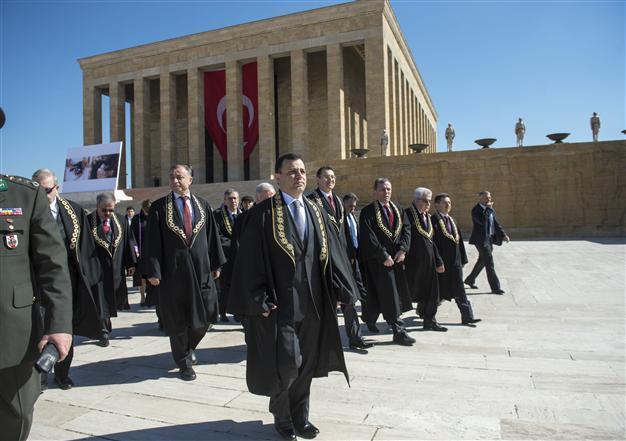Turkey's top court chief and gov’t in disharmony over individual access burden
Oya Armutçu - ANKARA

AA Photo
The president of Turkey’s Constitutional Court has made it clear they can cope with the massive number of individual applications filed to the Court and indicated there was no need for a systemic review of the current mechanism, as the government has suggested.
The Court has thematically classified its rapporteurs, thus paving the way for expertise, said President Zühtü Arslan, while speaking to reporters late on April 23, during a reception hosted at parliament marking National Sovereignty and Children’s Day.
Arslan argued this practice relieves the top court of the issue of individual applications piling up, adding they have been trying to get over the current backlog.
“Very wrong perceptions have been occurring among the public. At the moment, we don’t have such a burden concerning individual applications which we wouldn’t be able to cope with,” he said.
The top judge’s remarks came at a time when there were speculations the ruling Justice and Development Party (AKP) government intends to take away the right to individual application to the Constitutional Court.
A promise in the AKP’s election manifesto announced on April 15 in the run-up to the June 7 parliamentary election sparked further speculations.
“In the face of a possible harm to the performance of the Constitutional Court by the extreme workload that individual applications have brought to the Court, we will review this practice,” the ruling AKP said in its manifesto.
As of April 17, while announcing his government’s new strategy to reform the judiciary, in an apparent response to speculations, Prime Minister Ahmet Davutoğlu said it was this government which introduced the right to individual application to the country and to the contrary of claims, it has not disturbed this process.
The prime minister said it was the top court that complained about the growing number of individual applications, which prevent the Court from doing its main jobs. “30,000 cases of individual applications wait before the Constitutional Court. This is even more than the European Court of Human Rights, which accepts applications from 55 countries,” he said.
‘No such calamitous picture’
While speaking to reporters on April 23, Arslan underlined more than once the Court’s capability to deal with those applications.
When journalists recalled the government’s criticism at the Constitutional Court, suggesting that the content of individual applications have been beyond constitutional limits, Arslan said they have been taking all kinds of criticisms into consideration.
“As I said, there are really some hardships in regards to individual application. There are an increasing number of applications, but at the same time, there is a will which can cope with these and there are endeavors. There is no such calamitous picture before us,” Arslan said.
Individual access to legislation came into effect in September 2012, as part of a set of reforms that were voted on in the Sept. 12, 2010, referendum – reforms that were carried out as part of Turkey’s bid for full EU membership.
For the last two years, the Constitutional Court has been targeted by the government over its rulings on individual complaints. The top court’s visibility has grown due to crucial decisions it has made, such as its April 2, 2014, ruling concerning Turkey’s block on Twitter access.
In its ruling, the Constitutional Court said the block violated freedom of expression and individual rights. The ruling marked the most significant legal challenge yet to the ban, which caused public uproar and international condemnation.
Throughout 2014, the Court angered then-prime minister President Recep Tayyip Erdoğan and the AKP with a series of liberal rulings, including its lifting of the Twitter ban in April 2014 and its lifting of the YouTube ban one month later, on the grounds that both were a violation of freedom of expression. At the time, Erdoğan had criticized the Court’s ruling to unblock Twitter for being made without exhausting all legal paths.
